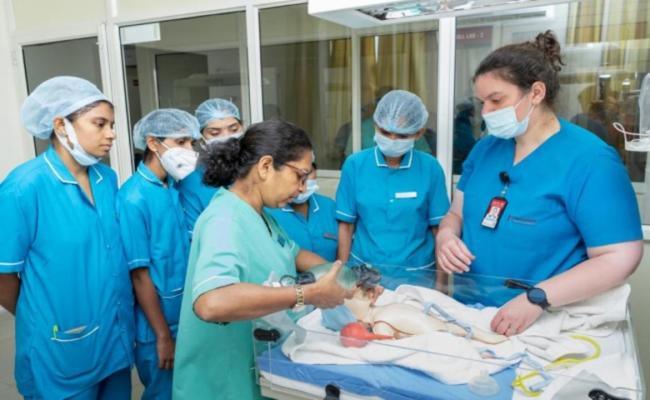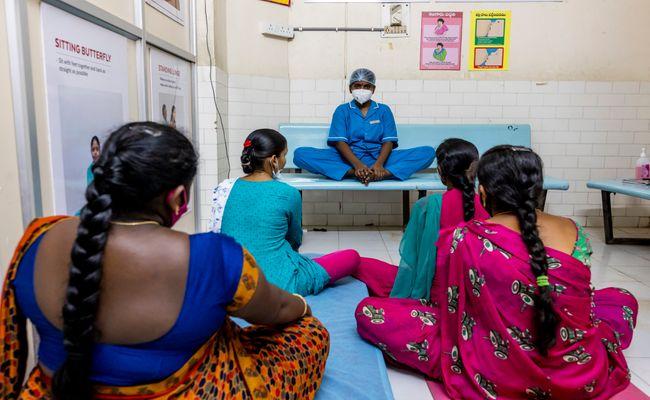Telangana’s Respectful Maternity Care Initiative for Saving Pregnant Women and Neonates

By Mohammed Rayees ur Rahim
Taj Mahal, a monument of eternal love of Mughal emperor Shah Jahan towards his wife Mumtaz Mahal aka Arjumand Banu Begum, also tells the story of maternal death as she died at a young age of 39 years due to postpartum haemorrhage (PPH) or excessive bleeding during childbirth. Despite significant advances in medicine and technology, many women in India still suffer the fate of Mumtaz (maternal death).
PPH is the leading cause of maternal death globally as it contributes to maternal mortality ratio (MMR). The maternal mortality ratio can be defined as the “number of maternal deaths during a given time period per 1,00,000 live births during the same time period.”
As per the WHO report, among the 10 countries that recorded 59 percent of maternal deaths worldwide, Nigeria (58,000) and India (45,000) account for more than a third of all estimated global maternal deaths in 2015. Since then, India is consistently reporting a decline in the maternal mortality ratio.
India is inching towards the global SDG target of 70 per lakh live births by 2030. As per the Sample Registration System (SRS) March 2022 edition, seven states have achieved the United Nations SDG target — Kerala(30), Maharashtra(38), Telangana(56), Tamil Nadu(58), Andhra Pradesh(58), Jharkhand(61) and Gujarat(70). The Health Minister T Harish Rao congratulated the state health department for making rapid improvement on the key indicator of maternal mortality.
From 92 to 56 - our Maternal Mortality Rate defines our devotion towards our people. We rank 3rd in the India after Kerala & Maharashtra. #KCRKit flagship program has been instrumental in this regard. pic.twitter.com/HScoy6BmrG
— Harish Rao Thanneeru (@trsharish) March 11, 2022
Initiative to curb C-sections
Though Telangana has a reason to rejoice, in terms of C-section (Caesarean) deliveries, the Telugu state still reports more than 50 percent medical interventions. While C-section deliveries can save lives of pregnant mothers and newborns, it’s become a matter of convenience and concern for both the obstetrician and the pregnant women to elect a surgical delivery. A staggering 75 percent of interventions including C-sections are being carried out in the private hospitals..
Deeply concerned with the alarming number of C-sections in the state, in 2017 the Telangana government implemented health reforms to tackle the increasing number of Caesarean sections with a focus on reducing the MMR.
Introduction of midwifery care
To find an alternative model delivery care to the number of rising C-section deliveries, the Telangana state government joined hands with the Fernandez Foundation and UNICEF and launched a midwifery program. In order to develop a Professional Midwifery cadre in the state, the Telangana government for the first time in the country, launched the 18-month Nurse Practitioner in Midwifery (NPM) programme on 31 October 2017.
Under this tripartite partnership, the Hyderabad-based Fernandez Hospital, an accredited institution, is running a Post Basic Diploma in Nurse Practitioner in Midwifery (NPM) with 10 seats. At this hospital, a combination of national and international educators are training the nursing students in midwifery with a 18 months course (one year of classroom+skill lab training and a six months clinical internship) based on International Confederation of Midwives (ICM) competencies.
Positive Childbirth Experience
In this midwifery programme, the first thing midwives learned was that a pregnant woman should not be treated as a patient, but a mother. The trainee midwives at the Government Area Hospital in Nampally in Hyderabad said, they had to unlearn a lot of things in the midwifery. These midwives are contributing to natural birthing by promoting positive child birthing experience. Not only these midwives are trained to provide respectful maternity care throughout pregnancy and childbirth, but they are also moulded into decision-makers who could identify normal and abnormal birthing cases and if required refer the pregnant woman and the newborn to the area hospitals for prompt intervention.
The Telangana government has taken measures to increase institutional births and provide quality maternal health. As part of these measures, in 2017 the government launched the KCR Kit Scheme and standardised over 300 labour rooms in the state which has contributed to an increase in the number of deliveries in public healthcare facilities. The KCR Kit contains 16 items to help care for a newborn baby. Through this scheme, Rs 13,000 for the birth of a girl and Rs 12,000 for the birth of a boy is directly transferred to beneficiary bank accounts in four instalments.
Bhadradri Kothagudem collector Anudeep Durishetty took his wife Madhavi Durishetty to the Government Area Hospital in the district where she gave birth to a boy. Sharing his feedback about the midwifery services in a public hospital, the district collector wrote:
Midwives are very professionally trained. Their dedication to the job and their knowledge about the birthing process is really impressive. As a collector, I feel proud of the hospital services.
Midwifery Care-led Unit
The midwives at the Government Area Hospital, Vanasthalipuram were seen giving emotional support to the pregnant women and answering all their queries regarding the pregnancy stages and the diet plan they need to follow. The midwives were teaching the expecting mothers different physical exercises to ensure safe childbirth. The pregnant women, who were doing exercises like stretching in the birthing education room said, they ‘come to the midwifery clinic regularly as the midwives here have been very helpful and guiding them properly.’
Midwife - First point of contact
Midwives are the first point of contact for visiting pregnant women at the midwifery care-led units in Telangana. During the screening of pregnant mothers, if the midwives see any abnormality in any pregnant woman, they refer her to a medical officer or specialists for further clinical management. For eligible women who have no pregnancy-related complications, the midwives hold education and physical exercises sessions for them. They plan the care of mothers and educate these women how to have a healthier pregnancy and a vaginal birth.
The women in the midwifery care led-unit, who have received respectful maternal care, said there was a stark difference between the pre-midwifery and midwifery support provided at the hospital. Narmada, a 24-year-old mother from the outskirts of Hyderabad, while comfortably sitting on the midwifery care-led unit bed said, “I came to the area hospital around 6 am on Friday, April 22 after experiencing the labour pains and within a span of three hours I gave birth to a baby boy. Thanks to the midwives' birth plan from day one of my pregnancy, I had a normal birthing.”
Meital Rusdia, Chief Field Office, UNICEF field office for Andhra Pradesh Karnataka and Telangana believes that since this initiative is promoting respectful maternal care and ‘natural births’, thereby it is also contributing to the reduction in the number of interventions.
“Midwifery is a proven, globally acclaimed intervention that can prevent as many as 83 percent of all maternal and newborn deaths. With this in view, UNICEF has partnered with the Government of Telangana and Fernandez Foundation to launch the Midwifery Initiative in the state. The initiative has promoted respectful maternal care and ‘natural births’, thereby also bringing down the C-sections. Telangana has been a pioneer on this front and learnings from the state initiative have fed into the national Midwifery Initiative. This is a game changer and a sustainable solution to the health personnel gap in the country.”
First Cohort
Under this NPM programme, a total of 30 government staff nurses who were selected through a rigorous selection process, were trained by the Fernandez Foundation for 12 months at Mother and Child Health Hospital (MCH), Karimnagar followed by a six-month internship at MCH, Sangareddy. The new cohort was mentored by a team of senior clinical midwives from the United Kingdom and home-grown midwives from the Fernandez Foundation. First batch of professionally trained midwives are providing quality maternal and neonatal services in remote areas.
Speaking to Sakshi Post, Dr Evita Fernandez, chairperson of Fernandez Foundation, explained that a midwife is a person who has successfully completed a midwifery education programme that is duly recognised in the country where it is located and that is based on the International Confederation of Midwives (ICM) Essential Competencies for Basic Midwifery Practice.
“I am completely convinced that India needs a cadre of professional midwives and I’m here to help the government to bring about this transformation and establish midwifery-led care units across its public hospitals.” Dr Evita said while adding, “the midwives have been trained to provide pregnant women with a respectful, compassionate and dignified birthing process.”
Fernandez Foundation has set up a state-of-the-art skill lab in Hyderabad where the midwives are trained by the national and international educators with mannequins (manikins) simulating real life situations. The educators said the trainee midwives can make as many mistakes as they want in this simulation lab to gain confidence before stepping into the real labour room.
















